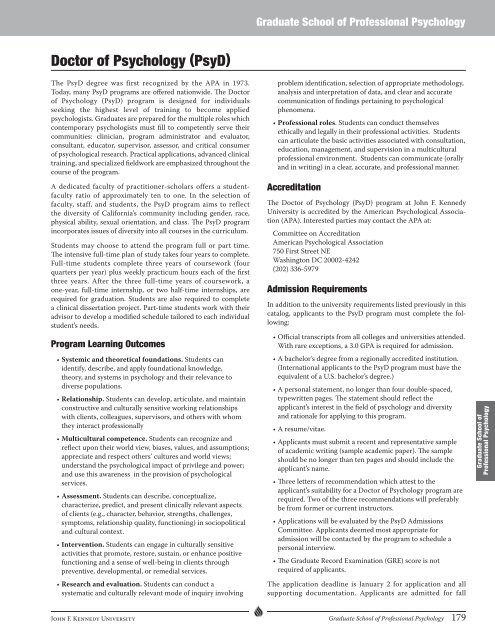General Catalog - John F. Kennedy University
General Catalog - John F. Kennedy University
General Catalog - John F. Kennedy University
- No tags were found...
You also want an ePaper? Increase the reach of your titles
YUMPU automatically turns print PDFs into web optimized ePapers that Google loves.
Graduate School of Professional PsychologyDoctor of Psychology (PsyD)The PsyD degree was first recognized by the APA in 1973.Today, many PsyD programs are offered nationwide. The Doctorof Psychology (PsyD) program is designed for individualsseeking the highest level of training to become appliedpsychologists. Graduates are prepared for the multiple roles whichcontemporary psychologists must fill to competently serve theircommunities: clinician, program administrator and evaluator,consultant, educator, supervisor, assessor, and critical consumerof psychological research. Practical applications, advanced clinicaltraining, and specialized fieldwork are emphasized throughout thecourse of the program.A dedicated faculty of practitioner-scholars offers a studentfacultyratio of approximately ten to one. In the selection offaculty, staff, and students, the PsyD program aims to reflectthe diversity of California’s community including gender, race,physical ability, sexual orientation, and class. The PsyD programincorporates issues of diversity into all courses in the curriculum.Students may choose to attend the program full or part time.The intensive full-time plan of study takes four years to complete.Full-time students complete three years of coursework (fourquarters per year) plus weekly practicum hours each of the firstthree years. After the three full-time years of coursework, aone-year, full-time internship, or two half-time internships, arerequired for graduation. Students are also required to completea clinical dissertation project. Part-time students work with theiradvisor to develop a modified schedule tailored to each individualstudent’s needs.Program Learning Outcomes• Systemic and theoretical foundations. Students canidentify, describe, and apply foundational knowledge,theory, and systems in psychology and their relevance todiverse populations.• Relationship. Students can develop, articulate, and maintainconstructive and culturally sensitive working relationshipswith clients, colleagues, supervisors, and others with whomthey interact professionally• Multicultural competence. Students can recognize andreflect upon their world view, biases, values, and assumptions;appreciate and respect others’ cultures and world views;understand the psychological impact of privilege and power;and use this awareness in the provision of psychologicalservices.• Assessment. Students can describe, conceptualize,characterize, predict, and present clinically relevant aspectsof clients (e.g., character, behavior, strengths, challenges,symptoms, relationship quality, functioning) in sociopoliticaland cultural context.• Intervention. Students can engage in culturally sensitiveactivities that promote, restore, sustain, or enhance positivefunctioning and a sense of well-being in clients throughpreventive, developmental, or remedial services.• Research and evaluation. Students can conduct asystematic and culturally relevant mode of inquiry involvingproblem identification, selection of appropriate methodology,analysis and interpretation of data, and clear and accuratecommunication of findings pertaining to psychologicalphenomena.• Professional roles. Students can conduct themselvesethically and legally in their professional activities. Studentscan articulate the basic activities associated with consultation,education, management, and supervision in a multiculturalprofessional environment. Students can communicate (orallyand in writing) in a clear, accurate, and professional manner.AccreditationThe Doctor of Psychology (PsyD) program at <strong>John</strong> F. <strong>Kennedy</strong><strong>University</strong> is accredited by the American Psychological Association(APA). Interested parties may contact the APA at:Committee on AccreditationAmerican Psychological Association750 First Street NEWashington DC 20002-4242(202) 336-5979Admission RequirementsIn addition to the university requirements listed previously in thiscatalog, applicants to the PsyD program must complete the following:• Official transcripts from all colleges and universities attended.With rare exceptions, a 3.0 GPA is required for admission.• A bachelor’s degree from a regionally accredited institution.(International applicants to the PsyD program must have theequivalent of a U.S. bachelor’s degree.)• A personal statement, no longer than four double-spaced,typewritten pages. The statement should reflect theapplicant’s interest in the field of psychology and diversityand rationale for applying to this program.• A resume/vitae.• Applicants must submit a recent and representative sampleof academic writing (sample academic paper). The sampleshould be no longer than ten pages and should include theapplicant’s name.• Three letters of recommendation which attest to theapplicant’s suitability for a Doctor of Psychology program arerequired. Two of the three recommendations will preferablybe from former or current instructors.• Applications will be evaluated by the PsyD AdmissionsCommittee. Applicants deemed most appropriate foradmission will be contacted by the program to schedule apersonal interview.• The Graduate Record Examination (GRE) score is notrequired of applicants.The application deadline is January 2 for application and allsupporting documentation. Applicants are admitted for fallGraduate School ofProfessional Psychology<strong>John</strong> F. <strong>Kennedy</strong> <strong>University</strong>Graduate School of Professional Psychology 179















